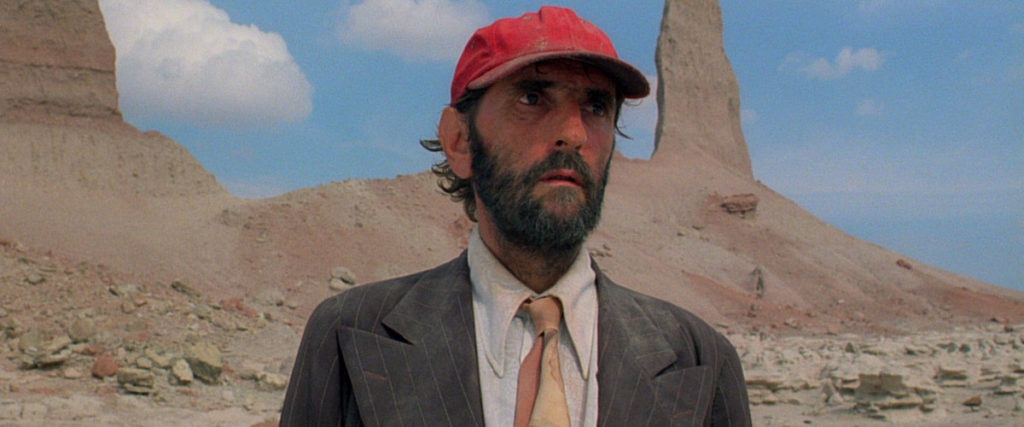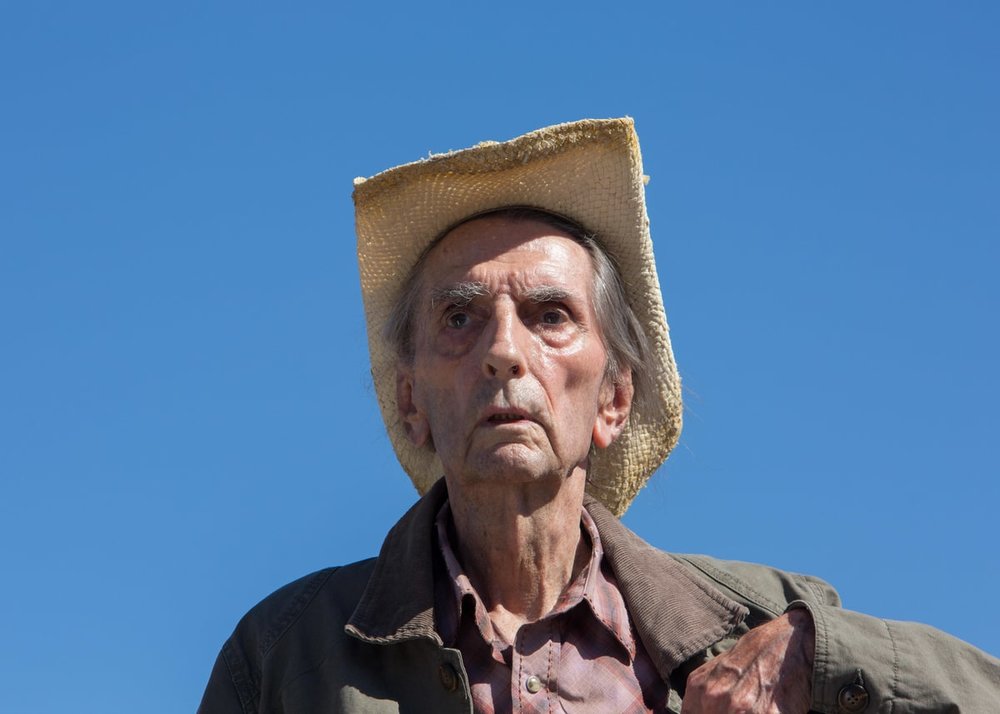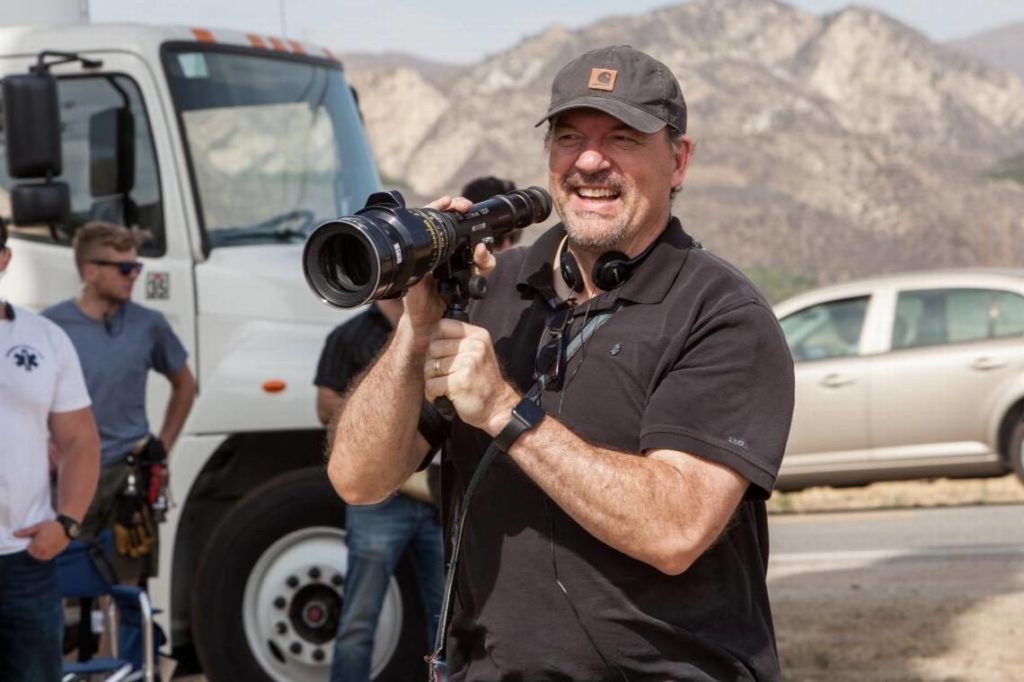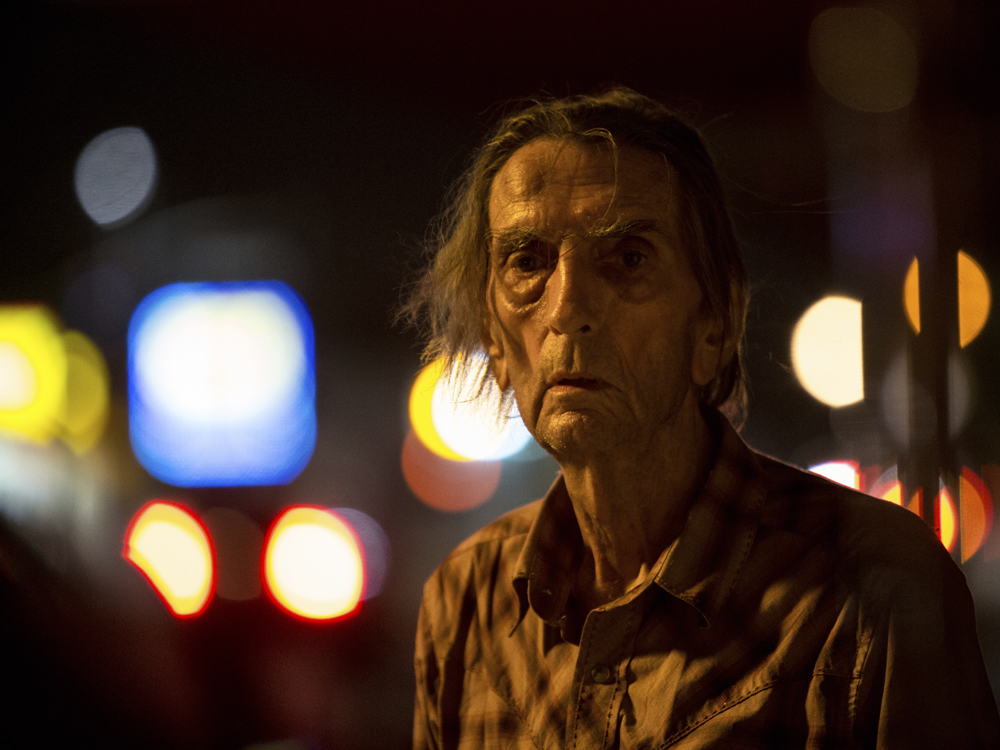Reviews include Irena’s Vow, The Beast, and Before I Change My Mind.
Getting Lucky: Remembering Harry Dean Stanton with John Carroll Lynch
October 6, 2017
We are still struggling to understand what it means to be a screen actor.
It is rarely written about with the same literacy brought to other aspects of filmmaking. The form is young and precariously, if fascinatingly, tethered to stardom. The frontier that separates cinema and theatre remains porous: The skills are transferrable yet distinct, sometimes opposite. It is the difference between communicating with an audience in the shared, ephemeral space of the present and casting an apparition to be dissembled and re-assembled for audiences to glimpse and study in the future via the juju of technological mediation. Harry Dean Stanton, who died last month at 91, was profoundly, singularly gifted in this ability to do the latter; his capacity to do the former is not something I for one can vouch for. In the 1980s, a dear friend of mine came tantalizingly close to casting Stanton as Willy Loman at a regional theatre. Stanton ultimately, graciously backed out, so my friend never found out if the actor who harnessed the miracle of Paris, Texas could transmit something of equal spellbinding power on stage, night after night. Stanton is gone now, and I suspect we’ll be grappling to comprehend his seemingly casual magic for many years to come.

Lucky, Stanton’s final feature, was, amazingly, only his second turn at holding the lead, if we don’t count Sophie Huber’s remarkable portrait Harry Dean Stanton: Partly Fiction, which, as the title suggests, also contains something of a performance. The screenwriting debut of Logan Sparks and Drago Sumonja and the debut directorial of veteran actor John Carroll Lynch, Lucky is a very charming and faintly corny character study. It carries pleasing echoes of Jim Jarmusch’s Paterson, which, besides its structure grounded in quotidian repetition, its undercurrent of existential questions and its tracking of incremental internal shifts, it also shares with Lucky both a veteran protagonist and Barry Shabaka Henley in the role of a proprietor whose establishment the protagonist frequents. These curious similarities are doubtlessly a confidence, since Lucky was obviously conceived and written expressly for Stanton, the titular character sharing numerous attributes with the famously idiosyncratic actor. There is an opportunity for Stanton to sing “Volver” with a mariachi band and a supporting cast featuring some of Stanton’s friends, such as Ed Begley, Jr and David Lynch. The film feels like a parting gift to Stanton, which he reciprocates in spades. His voice is a wheeze from a perforated accordion, his body a weary reed, but he is as vital and immediate a presence in Lucky as any actor in any film.

John Carroll Lynch’s many acting credits include Fargo, Zodiac, Gran Torino, Bug, Shutter Island and Jackie. He’s worked with some of the finest American directors of the last 25 years, though judging from the New Hollywood aesthetic of Lucky, his sensibility may be more in keeping with directors of the decades preceding his start in the business. Lynch comes off as very kind—how could the man who played Norm Gunderson not be?—but also thoughtful and articulate.
Had you known Harry Dean before?
I knew him socially. I had met him a few times at Dan Tana’s in Los Angeles. I enjoyed his company. I didn’t know him well personally, which turned out to be good for the director-actor relationship, because I think it was better that I approached this project as a colleague.
You’ve made a prolific career as this thing we call a character actor. Harry Dean Stanton was arguably the most renowned character actor of his generation, a sort of genius of presence. It comes through his breath, his gaze.
He mastered the art of silence.
I think of that scene in Zodiac where you’re being questioned. I wonder if something similar isn’t at work. You bring so much into that scene and then give nothing away. It creates an exquisite tension.
Harry Dean was always something to aspire to. I had of course seen Harry Dean before having the desire to act, but when I saw those two performances in 1984, Repo Man and Paris, Texas, I was struck by his great ability to transform from the inside. Through his containment he transmitted to his audience the heartbreak and longing of this character in Paris, Texas. Then the other side of that, in Repo Man, was a matter of him grabbing the audience by the throat and not letting go. Those performances made me want to have that kind of range.

When artists we know as actors go on to direct, the focus is so often on their ability to guide the performances of other actors. I wonder if it was possible to really direct Harry Dean Stanton?
Sure. He is directed just like any other actor is. The director’s job is not only to guide the performance, but also to guide the performance toward story and also to guide the performance toward synchronization with the camera. All three of those things need tending to no matter who the actor is. At the same time, why would you choose to work with an actor with over 60 years of experience and not listen to them? That would be ludicrous. So it was a collaboration between Harry and the writers and producers and myself to contribute to the overall sharpness and focus of the story. It’s the same as with any other actor—the difference is the vocabulary. Harry only responded to anything that was pertinent to that individual moment in time. He would not respond to discussion of things outside of that moment. That was one of the reasons why he displayed such depth of being in his work. He insisted on staying present in that moment. You couldn’t give him a note about what’s going to happen three scenes later. You had to earn it then. Which is not necessarily how I work. But it is a long-standing tradition in acting. He was the master at it.
There is an aspect of Lucky that nearly slips into documentary. So much about Lucky aligns with things we know about Harry Dean Stanton: his Kentucky roots, his solitude, his drinking and smoking, his predilection for the word “bullshit.” How did you negotiate with him the degree to which he was playing some variation on himself?
I think people outside the acting community might have the impression that playing someone similar to yourself is easier than playing a role to which you rely more on your imagination and observational skills. The fact of the matter is that to take so many details of his own life and re-orient them toward the creation of a fictional character, to rearrange them for the purposes of creating a story about someone who finds within him the ability to live in the shadow of death with joy, is something I don’t think the writers really anticipated, with regards to the difficulty that Harry would have. Because it was so revealing, so vulnerable for him. This role also said some things that I think he always wanted to say. The crosscurrents of how the autobiographical behaviour and stories fit into a different context was the struggle. How do you create someone else out of the stories you lived? That was something we negotiated over the course of making the film. When I went into the editing phase of the process I realized what a bounty of moments he had produced, things I had seen on the day but hadn’t realized how rich and detailed they were in the context of the character’s journey.
I also marvelled at the depth and complexity of the performance you drew out of David Lynch. I’d never seen Lynch deliver anything quite like that before. Was this partly a result of his friendship with Harry Dean?
It certainly gives you a leg up. When you only have two days with the actor playing the second largest part in the film, it helps that the two men playing best friends are actually best friends. I’ve had the good fortune of working with people over time in different circumstances. When this has happened it’s always proven to me that there is no substitute for long-term knowing. You can, of course, do it otherwise. As an example, something I enjoyed thoroughly was working with Nick Offerman on The Founder. My experience of working with him and my experience of seeing the work was that the evocation of a long-time brotherhood was believable in that case. We had never worked together, so it’s possible. But you have a shorthand with people that you know, an affinity with people that you know and especially with people that you love. And those two men, David and Harry Dean, loved each other.

Given that he’s also one of the world’s most distinctive directors, did Lynch’s presence affect or instruct you? Did you come to Lucky with an idea as what sort of precedents might guide you? Did you know what you were looking for in terms of establishing your directorial voice?
David was so respectful of my position. He never gave me advice. He just let me work. I was quite appreciative of that. It was a great gift on his part. That being said, the movie has a compendium of work that we looked at and were inspired by, and that work included films by David Lynch. With regards to my personal style as a director, I suspect I will have to wait for a second or third film to really know what that is. With Lucky, I really focused on developed the tools I required to tell this story. When I go on to another project, you and I might have a conversation about what my individual style is, apart from what might be evident in this story. I look forward to finding that out.



